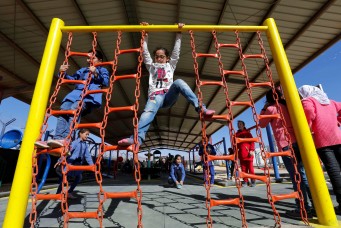The Attack on Civil Society Outside Cairo
Since President El-Sisi has taken office, an unprecedented government crackdown has rendered large parts of the country without any independent human rights groups.
Civil society in Egypt is undergoing an unprecedented wave of repression. The government is not only targeting NGOs that have played a vital role in documenting human rights violations. It appears the state is attempting to silence or subdue virtually the entire spectrum of civil society, including activists across the political spectrum, cultural initiatives, independent media outlets, feminist organizations, Nubian associations, and even co-working spaces or cafes where young people gather.
A secretly drafted NGO law approved by parliament on November 15 requires that civil society associations work “within the scope of the state’s plans” and effectively gives security authorities oversight over organizations’ work and funding. Article 14 of the law also prohibits a broadly-defined range of activities that “result in destabilizing the national unity, national security, public law and order, and public morals,” as well as doing field research or coordinating with any “foreign entity” without notifying the Coordination Committee.
The new NGO law is just the most recent escalation of the crackdown. In late 2011, armed Egyptian security forces raided the offices of four American, one German, and a number of Egyptian civil society organizations. Equipment, documents, and cash were confiscated. In June 2013, 43 NGO employees, including sixteen U.S. citizens, were convicted of operating illegal organizations and accepting foreign funding. This led to a significant crisis in U.S.-Egyptian relations and prompted Congressional hearings.
After this attack on international organizations, Egyptian NGOs were next. Virtually the entire leadership of the Egyptian human rights community has been targeted with travel bans, asset freezes, or summons for informal questioning and arrests. Azza Soliman, founder of the Center for Egyptian Women’s Legal Assistance (CEWLA), was arrested on December 7. Prior to the arrest, her assets were frozen when she tried to travel to Jordan in November. As part of its trials against NGOs, the Cairo Criminal Court has also frozen the assets of a number of organizations’ directors, including Hossam Bahgat of the Egyptian Initiative for Personal Rights (EIPR), Gamal Eid of the Arab Network for Human Rights Information (ANHRI), Bahey El Din Hassan of the Cairo Institute for Human Rights Studies (CIHRS), and Mohamed Lotfy, director of the Egyptian Commission for Rights and Freedoms (ECRF). The list goes on. While authorities have often targeted high-profile figures, many of the rank-and-file members of the human rights community have lost their jobs, as frozen assets mean many organizations have had to downsize or close down. At its peak, the Egyptian Initiative for Personal Rights (EIPR) employed about 80 people across the country, but now includes about 30 full-time employees.
The leading human rights organizations in Cairo are fighting just to keep their doors open. Outside the capital the situation is even more dire. Branch offices that a number of these human rights organizations had established in Alexandria and Upper Egypt have now nearly all been shut down. Fearing for the safety of their staff and lacking funds, EIPR closed its Luxor office in 2014. The Egyptian Center for Economic and Social Rights (ECESR), founded by Khaled Ali, perhaps the most prominent labor lawyer in the country, has suspended its activities in Alexandria and Aswan. The Aswan office of the Hisham Mubarak Law Center closed early in January after 20 years in operation.
The impact of the crackdown is felt most outside of Cairo, where the human rights communities are smaller, and therefore more vulnerable. In smaller cities or towns, authorities can easily target what may be the lone human rights organization in the entire governorate. Once it is gone, there may be none left. Also border governorates—such as Aswan, Sinai, and Matrouh—have to deal with an extra layer of red tape—in addition to the infamously inefficient government bureaucracy all civil society faces in Egypt. According to the new law, all NGOs in these regions need to secure permits from the Ministry of Social Solidarity and also from their governors, who are almost always from the military. Even when NGOs manage to obtain all the necessary permits, governors can still refuse to release their funding—which has to go through the ministry of Social Solidarity. One official in Aswan has become so notorious for preventing the transfer of funds to NGOs that he was nicknamed the High Dam.
Some regions outside of Cairo, in particular Upper Egypt, have higher concentrations of minorities (Minya and Assiut have large populations of Coptic Christians, and Aswan has a large Nubian community) that will have limited access to legal aid if local NGOs are shut down. Discrimination against Upper Egyptians has worsened as the government crackdown increases the inequalities between urban and rural areas. The repression coming from the highest levels emboldens even low-ranking state officials to take action to squash civil society—even when they have no mandate to do so. Members of one women’s initiative in Upper Egypt reported they were prevented from traveling by a low-ranking official in the airport for no clear reason.
Fewer NGO branch offices means fewer people will be available to document and respond when human rights violations occur. According to data collected by WikiThawra, 41,163 arrests or arrest warrants were issued just in the first eleven months since Mohamed Morsi was ousted on July 3, 2013. The EIPR branch office in Luxor was the first organization there to defend the rights of prisoners and detainees. Despite the wave of government propaganda and media defamation of civil society organizations, this work was welcomed by the local people. “They knew us, and we helped them,” said Safaa Yousef, former director of the Luxor regional office. Since their office was shut down in late 2014, there has been no other organization in Luxor to defend detainees.
The shuttering of these human rights organizations also negatively impacts other types of civil society organizations (CSOs). The Permanent Conference for Workers, a coalition of independent syndicates in Alexandria, used to hold their meetings at the ECESR, which also provided them legal support. Now that their office in Alexandria is closed, the workers have yet to find an alternative place to meet. A number of CSOs have said that they now avoid using terms like “democracy” or “political participation.” One group in Minya said that the Social Affairs Directorate only accepted its application for a project on raising awareness about citizenship after they removed the word “citizenship.” Even groups that are merely trying to uphold the state’s own laws face difficulties. Two women’s initiatives working in rural villages around Assiut to educate locals about the problems surrounding child marriage, which is prohibited under Egyptian law, faced so many problems with the authorities that they had to cease their activities.
Despite this environment of unprecedented hostility, many of the local NGOs and activists interviewed say they have no intention of quitting. Nubian activists in particular have continued to hold demonstrations, flaunting the November 2013 protest law that has silenced so many other activist groups. These have included protest camps, “Right to Return” caravans traveling to the ancestral Nubian homelands, and a YouTube channel called Nuba Tube to promote the Nubian language. One group of Nubian women were told by an official that he would not allow them to register their NGO as long as they had an all-female board of directors, so they simply added one of their brothers.
In addition, one CSO in Upper Egypt is suing the Ministry of Social Solidarity, which by law has to respond to an NGO’s request to register within 60 days. However, NGOs complain that the Ministry never replies, delaying their activities and leaving them unsure whether they can legally work. A technical committee recommended in favor of the organization, which awaits its next court session.
And many local NGOs and cultural initiatives do continue to exist in Alexandria and Upper Egypt. The Covenant Center for Legal Support, a new law firm, was established in Qena in May 2016. It takes on cases of human rights violations, including defending four students at the University of Assiut who had organized a campus event about the Tiran and Sanafir islands. However, many local organizations fear that their days may be numbered. As one human rights lawyer in Aswan said, “Once they finish the big organizations, they will come after us.”
During Hosni Mubarak’s 30-year reign, human rights organizations did experience harassment, but they were able to find legal backdoors that allowed them to do their work by registering as law firms or limited liability companies. The current NGO law, if approved by President Abdel Fattah el-Sisi, would make this impossible. While the attacks against the Cairene human rights community have been widely reported, it is the quiet suffocation of civil society outside the capital that will affect the greatest number of Egyptians.
This article is reprinted with permission of Sada. It can be accessed online here.
Amy Austin Holmes is an Associate Professor of Sociology and Head of the Sociology Unit at the American University in Cairo. On Twitter: @AmyAustinHolmes



